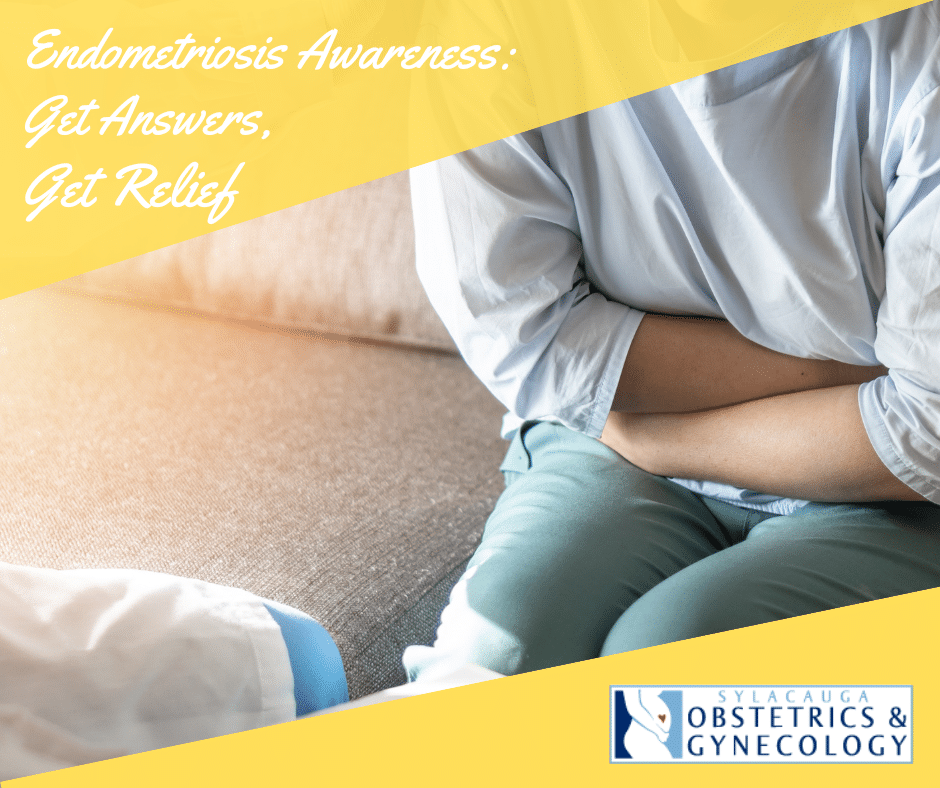
27 Feb Endometriosis Awareness: Get Answers, Get Relief
Endometriosis is one of the most common gynecological issues, affecting up to 10% of women in their childbearing years. Yet, despite its prevalence, we still don’t have a cure for endometriosis, and many women go undiagnosed for years. Endometriosis is a leading cause of chronic pelvic pain in women, yet it’s not a one-size-fits-all disease. Because of that, many women suffer in silence for too long, believing the symptoms are all in their heads or that pain is a normal part of being a woman.
Ahead of Endometriosis Awareness Month in March, the team at Sylacauga OB-GYN wants to highlight this disease: what it is, what it does to the body, and what can be done to achieve relief. We encourage women in the Coosa Valley Area to speak up about their pain and visit us to find answers!
What is Endometriosis?
Your uterus is lined with a special type of tissue called the endometrium. That tissue is what sheds every month during your menstrual cycle. In women with endometriosis, these cells form in places they shouldn’t—your ovaries, bladder, or fallopian tubes, most commonly. Just like normal uterine lining, these cells respond to signals from your hormones on a monthly cycle. But because they’re not where they’re supposed to be, this response can cause inflammation, swelling, intense pain, and scarring.
Over time, this cycle can cause a great deal of damage to the affected organs, particularly the reproductive organs. Endometrial tissue can fuse organs together and create further lesions, making it difficult to live your daily life, enjoy intimacy, or have a child.
How Do I Know if I Have Endometriosis?
Most women begin to suspect something is wrong in one of two ways. The first is extremely heavy or unusual menstrual cycles. You may experience severe period cramps (dysmenorrhea), heavy periods or bleeding between periods, chronic back pain, or pain with intercourse.
How do you know if your menstrual cramps are normal or severe? Here are a few signs that your pain isn’t normal:
- Over-the-counter pain relievers don’t help
- The pain is so intense that it interferes with your work or daily activities
- Cramps are associated with nausea or vomiting
- You have heavy or unusual bleeding (changing pads or tampons every hour, passing blood clots larger than a quarter, bleeding longer than one week)
For 20–25% of women, endometriosis is “silent,” meaning they don’t have symptoms. In fact, you may not suspect an issue until you start trying for a child, as endometriosis is a common cause of infertility. If you’ve been trying to conceive for a full year without success (or 6 months if you’re 35 or older), you should visit your OB-GYN.
How is Endometriosis Diagnosed?
Chronic abdominal pain can have many root causes, so oftentimes, endometriosis is diagnosed only after other conditions are ruled out. But with a skilled OB-GYN at a practice with the very latest technology and diagnostic techniques, a formal diagnosis is possible.
When you visit Sylacauga OB-GYN, we may ask questions like:
- How long have you been experiencing pain?
- How would you describe your pain?
- How would you describe your menstrual cycles?
- Is there anything that makes the pain better or worse?
- Does anyone in your family have endometriosis?
Confirming an endometriosis diagnosis requires a procedure called a laparoscopy. We make a small incision in the abdomen, then look through a small camera for evidence of endometrial tissue. This is the only way to know for sure whether you have endometriosis or another condition. Thankfully, our skilled team can perform this procedure right here in Sylacauga!
How Can I Manage Endometriosis?
There are a variety of lifestyle adjustments, medications, and procedures you can try to relieve your symptoms and get back to life uninterrupted. You know your body better than anyone, and our team at Sylacauga OB-GYN is ready to be your guide, helping you navigate these options to find what works best for your unique body, family goals, and preferences.
Here is a sample of the interventions we can make:
- Medications & Hormone Therapy: Many birth control methods, such as pills and IUDs, can provide relief. We can also try a type of medication called a Gonadotropin-releasing hormone (GnRH).
- Pelvic Floor Physical Therapy: This approach is gaining traction as one of the most effective and preferred methods for reducing pain. Requiring no medications and no surgeries, it has helped many women find natural pain relief. Read all about it in our previous blog!
- Lifestyle & Diet Adjustments: There is evidence that a healthy, anti-inflammatory diet can help combat endometriosis symptoms like bloating, fatigue, and pain. That means less red meat and more fruits, veggies, whole grains, and healthy fats. Exercise can help, too!
- Laparoscopic Surgery: Used both as a treatment and a diagnostic tool, laparoscopic surgery involves making a small incision in the abdomen. Your provider can check your organs for signs of endometrial tissue, scar tissue, or cysts. They can then use other instruments to treat these tissues.
You Deserve a Life Without Pain
Being strong doesn’t mean you have to ignore or downplay your pain. Severe pain is not a normal part of being a woman, and you shouldn’t have to live with it. Thankfully, you don’t have to suffer alone. Get to the root of the problem and find lasting relief with endometriosis treatment from Sylacauga OB-GYN!
An Endometriosis Doctor in Your Backyard: Serving Women in Sylacauga and Beyond!
Advanced medical care shouldn’t require long, disruptive trips to Birmingham and months-long waiting lists. Thankfully, women in Sylacauga, Talladega, Alexander City, Childersburg, and anywhere in the Coosa Valley Area have access to big city care from small town doctors who understand. Meet our OB-GYN team to learn more about our values and mission, and give us a call at 256-487-7783 to schedule your appointment!


